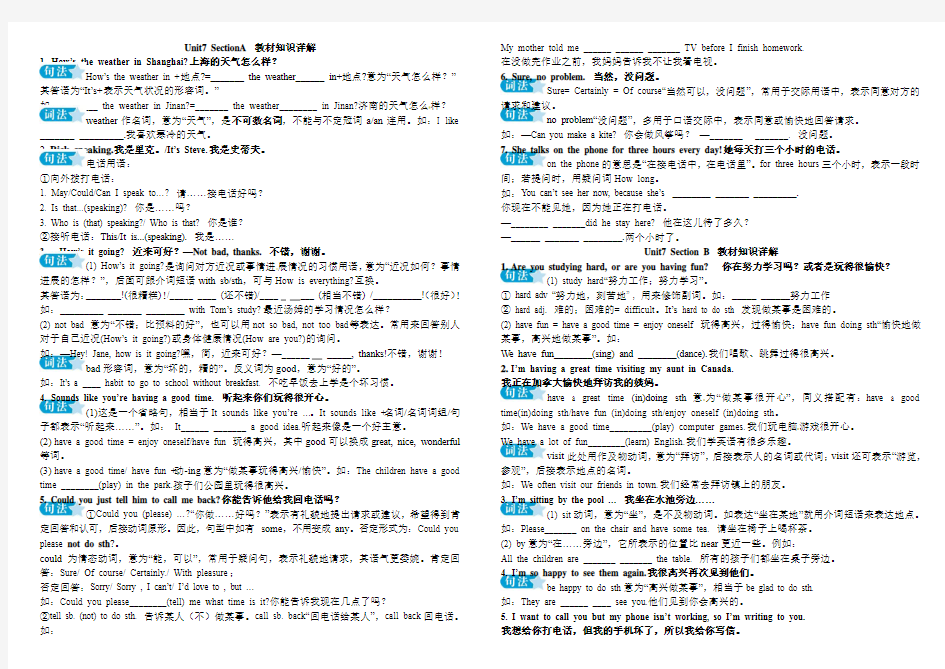七下Unit7教材知识详解


Unit7 SectionA 教材知识详解
1. How’s the weather in Shanghai?上海的天气怎么样?
How’s the weather in +地点?=_______ the weather______ in+地点?意为“天气怎么样?”其答语为“It’s+表示天气状况的形容词。”
如:________ the weather in Jinan?=_______ the weather________ in Jinan?济南的天气怎么样?
weather作名词,意为“天气”,是不可数名词,不能与不定冠词a/an连用。如:I like _______ _________.我喜欢寒冷的天气。
2.Rick speaking.我是里克。/It’s Steve.我是史蒂夫。
电话用语:
①向外拨打电话:
1. May/Could/Can I speak to…? 请……接电话好吗?
2. Is that...(speaking)? 你是……吗?
3. Who is (that) speaking?/ Who is that? 你是谁?
②接听电话:This/It is...(speaking). 我是……
3. —How’s it going? 近来可好?—Not bad, thanks. 不错,谢谢。
(1) How’s it going?是询问对方近况或事情进展情况的习惯用语,意为“近况如何?事情进展的怎样?”,后面可跟介词短语with sb/sth,可与How is everything?互换。
其答语为:_______!(很糟糕)!/_____ ____ (还不错)/____ ___ (相当不错) /__________!(很好)!如:_________ _______ ________ with Tom’s study?最近汤姆的学习情况怎么样?
(2) not bad 意为“不错;比预料的好”,也可以用not so bad, not too bad等表达。常用来回答别人对于自己近况(How’s it going?)或身体健康情况(How are you?)的询问。
如:—Hey! Jane, how is it going?嘿,简,近来可好?—______ _____, thanks!不错,谢谢!
bad形容词,意为“坏的,糟的”。反义词为good,意为“好的”。
如:It’s a ____ habit to go to school without breakfast. 不吃早饭去上学是个坏习惯。
4. Sounds like you’re having a good time. 听起来你们玩得很开心。
(1)这是一个省略句,相当于It sounds like you’re …。It sounds like +名词/名词词组/句子都表示“听起来……”。如:It______ _______ a good idea.听起来像是一个好主意。
(2)have a good time = enjoy oneself/have fun 玩得高兴,其中good可以换成great, nice, wonderful 等词。
(3)have a good time/ have fun +动-ing意为“做某事玩得高兴/愉快”。如:The children have a good time ________(play) in the park.孩子们公园里玩得很高兴。
5. Could you just tell him to call me back?你能告诉他给我回电话吗?
①Could you (please) …?“你做……好吗?”表示有礼貌地提出请求或建议,希望得到肯定回答和认可,后接动词原形。因此,句型中如有some,不用变成any。否定形式为:Could you please not do sth?。
could为情态动词,意为“能,可以”,常用于疑问句,表示礼貌地请求,其语气更委婉。肯定回答:Sure/ Of course/ Certainly./ With pleasure;
否定回答:Sorry/ Sorry , I can’t/ I’d love to , but …
如:Could you please________(tell) me what time is it?你能告诉我现在几点了吗?
②tell sb. (not) to do sth. 告诉某人(不)做某事。call sb. back“回电话给某人”,call back回电话。如:My mother told me ______ ______ _______ TV before I finish homework.
在没做完作业之前,我妈妈告诉我不让我看电视。
6. Sure, no problem. 当然,没问题。
S ure= Certainly = Of course“当然可以,没问题”,常用于交际用语中,表示同意对方的请求和建议。
no problem“没问题”,多用于口语交际中,表示同意或愉快地回答请求。
如:—Can you make a kite? 你会做风筝吗?—_______ _______. 没问题。
7. She talks on the phone for three hours every day!她每天打三个小时的电话。
on the phone的意思是“在接电话中,在电话里”。for three hours三个小时,表示一段时间;若提问时,用疑问词How long。
如:You can’t see her now, because she’s ________ _______ _________.
你现在不能见她,因为她正在打电话。
—________ _______did he stay here? 他在这儿待了多久?
—______ _______ ________.两个小时了。
Unit7 Section B 教材知识详解
1.Are you studying hard, or are you having fun? 你在努力学习吗?或者是玩得很愉快?
(1) study hard“努力工作;努力学习”。
① hard adv “努力地,刻苦地” , 用来修饰副词。如:_____ ______努力工作
② hard adj. 难的;困难的= difficult。It’s hard to do sth 发现做某事是困难的。
(2) have fun = have a good time = enjoy oneself 玩得高兴,过得愉快;have fun doin g sth“愉快地做某事,高兴地做某事”。如:
We have fun________(sing) and ________(dance).我们唱歌、跳舞过得很高兴。
2.I’m having a great time visiting my aunt in Canada.
我正在加拿大愉快地拜访我的姨妈。
have a great time (in)doing sth意为“做某事很开心”,同义搭配有:have a good time(in)doing sth/have fun (in)doing sth/enjoy oneself (in)doing sth。
如:We have a good time_________(play) computer games.我们玩电脑游戏很开心。
We have a lot of fun________(learn) English.我们学英语有很多乐趣。
visit此处用作及物动词,意为“拜访”,后接表示人的名词或代词;visit还可表示“游览,参观”,后接表示地点的名词。
如:We often visit our friends in town.我们经常去拜访镇上的朋友。
3. I’m sitting by the pool … 我坐在水池旁边……
(1) sit动词,意为“坐”,是不及物动词。如表达“坐在某地”就用介词短语来表达地点。如:Please_______ on the chair and have some tea. 请坐在椅子上喝杯茶。
(2) by意为“在……旁边”,它所表示的位置比near更近一些。例如:
All the children are _______ _______ the table. 所有的孩子们都坐在桌子旁边。
4. I’m so happy to see them again.我很高兴再次见到他们。
be happy to do sth意为“高兴做某事”,相当于be glad to do sth.
如:They are ______ ____ see you.他们见到你会高兴的。
5. I want to call you but my phone isn’t working, so I’m writing to you.
我想给你打电话,但我的手机坏了,所以我给你写信。
work 在这里是不及物动词,意为“(机器)运转;活动”。sth doesn’t/ didn’t work = There is something wrong with sth/ sth is broke “某物坏了,出故障了”.
如:My watch doesn’t_________. What time is it now? 我的手表坏了。几点了?
6.It’s hot in your country now, isn’t it?你们国家现在的天气很热,对吗?
本句是一个反意疑问句,表示提出情况或看法,询问对方同意与否。其构成:陈述句+简短问句。遵循原则:前肯,后否;前否,后肯。简短问句的主谓语与前面陈述句的主谓语在人称、时态和树上要保持一致。
如:Your mother goes to work every day, _______ _______?你妈妈每天都去上班,是吗?
It’s a nice day,________ ________? 今天天气很好,是吗?
7.One girl is skating on a river and a man is taking a photo of a snowman.
一个女孩正在河上滑冰,一位男士正在拍一张雪人的照片。
take a photo为固定短语,意为“拍照;照相”,相当于take photos。take a photo of sb/sth 意为“给某人/某物照相;拍一张某人/某物的照片。”
如:They are ________ ________ _______ of themselves by the beautiful lake.
他们正在那个美丽的湖边给自己拍张照。
8.Could you ask her to call me at 8765-4321?你能让他给我打个电话吗?号码是8765-4321。
(1) Could you please 意思是“请问你(们)能……吗?”表示委婉的请求,其后接动词原形。其肯定回答一般为:Yes, of course; Yes, with pleasure; Yes, no problem; Yes, I’m glad to.。否定回答:No, I can’t; Sorry, but..等。
如:—_______ ______ ______ take a message for her?你可以给她捎个口信吗?—Yes, no problem.
(2) ask sb (not)to do sth 要求某人(不要)做某事。
如:My mother asked me________(help) her with the washing.我妈妈让我帮她洗衣服。
(3)call sb at+电话号码意为“给某人打这个电话”;相类似的短语:call sb 给某人打电话。如:Please ________ ______ ______ 3457—5679. 请找我拨打电话3457—5679。
名师精讲:现在进行时
一、概念现在进行时表示说话时正在进行或发生的动作,也可表示当前一段时间内的活动或现阶段正在进行的动作。
结构:助动be ( am / is / are ) +现在分词。
二、现在分词的构成:
1.大多数动词后可在动词后直接加-ing,
2.如:do-________, read-________, think-________,drink-________, enjoy-________。
3.如果动词以-e结尾,则去掉-e,再加-ing,如:come-________, have-________, make-________, ride-________, write-________, take-________, use-________。
4.如果动词只有一个元音字母,而其后跟有一个辅音字母时,将此辅音字母双写,再加-ing,
口诀:四个t put-________, sit- _______ cut-________ get-__________。
两个运动run-___________, swim-____________
开始停止买东西begin-___________stop-__________, shop—___________
5.lie/lying(躺),die/dying(死),tie/tying(系,拴)是特殊变化要记住。
三、句型结构
1.现在进行时的肯定形式、否定形式、疑问形式及其回答,所有变化都体现在助动词be ( is / am / are )上。1)现在进行时的肯定形式:主语+be(am/ is/are)+doing+其他成分。如:
I __________(sing) now./They ________(write) now.
2)现在进行时的否定形式:主语+be(am/ is/are)+not +doing+其他成分。
如:I _________(not sing) now ./They ________(not write) now.
3)一般疑问句及回答:be(am/ is/are)+主语+doing+其他成分?
如:______you ______(sing)? Yes, I am. / No, I am not.
_______ they _________(write) ? Yes, they are. / No, they aren’t.
4)特殊疑问句及回答:特殊疑问词+be(am/ is/are)+主语+doing+其他成分?
如:What ________you ________(do)? We are playing. (要求就划线部分提问)
2.缩写形式如下I am—I’m;You are—You’re;He is—He’s;She is—She’s;It is—It’s;We are—We’re;They are—They’re
3.说明:不是所有动词都能用现在进行时态的,如:see、like、want、know等动词往往都不用进行时态。
四.用法
1.表示现在(指说话人说话时)正在发生的事情.往往与now, right now at the moment, look,listen 等词连用,以示强调。如:
We _____________(wait) for you now.
Look! She_________(learn) the piano under Mr. Black.
Listen! I _________(play) the drums.
Jim and Jenny _________(make) Zongzi right now.
2.表示长期的或重复性的动作,说话时动作未必正在进行:
Don’t take that book away. Your father_____________(use) it.
3.现在进行时(以及be going to)可以表示为将来安排好的活动和事件,用arrive, come, go, leave 等动词的现在进行时描写行程安排,也通常有“将到达”和“将离去”的意思:
My English teacher_________(leave) tomorrow morning.
4.当现在进行时表示某事发生的次数过多时,则有时含有抱怨,讨厌,赞扬等的意思:He _______always ________(sing) at night, and we can’t sleep at night.
现在进行时易错点指导
哪些动词不能用于进行时态
1. 表示状态的动词be。如:
Zhang Hong_______(be) in the room. 张红在房间里。不可以说:Zhang Hong is being in the room.
2. 表示感官的动词look, see, hear, smell, sound, feel等。如:
This pen ______(look) good. 这钢笔看起来不错。不可以说:This pen is looking good.
3. 表示拥有的动词have (has)。如:
He______( have) a new book. 他有一本新书。不可以说:He is having a new book.
4. 表示心理状态的动词want, know, think, hope等。如:
They ______( think) he is a student. 他们认为他是一名学生。不可以说:I am thinking he is a student. Peter________(want) some apples. 皮特想要些苹果。不可以说:Peter is wanting some apples.
5表示喜欢、厌恶的动词like, love等。如:
We______( like) playing football with them. 我们喜欢和他们踢足球。
不可以说:We are liking playing football with them.
